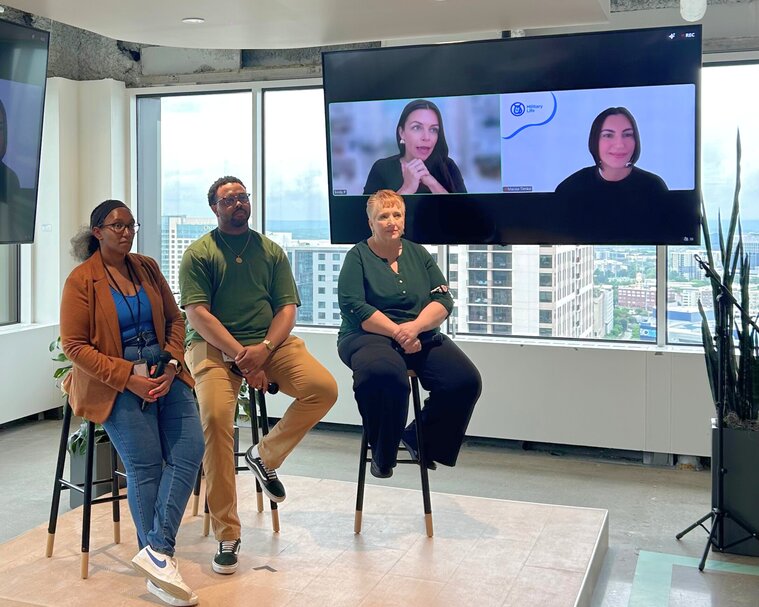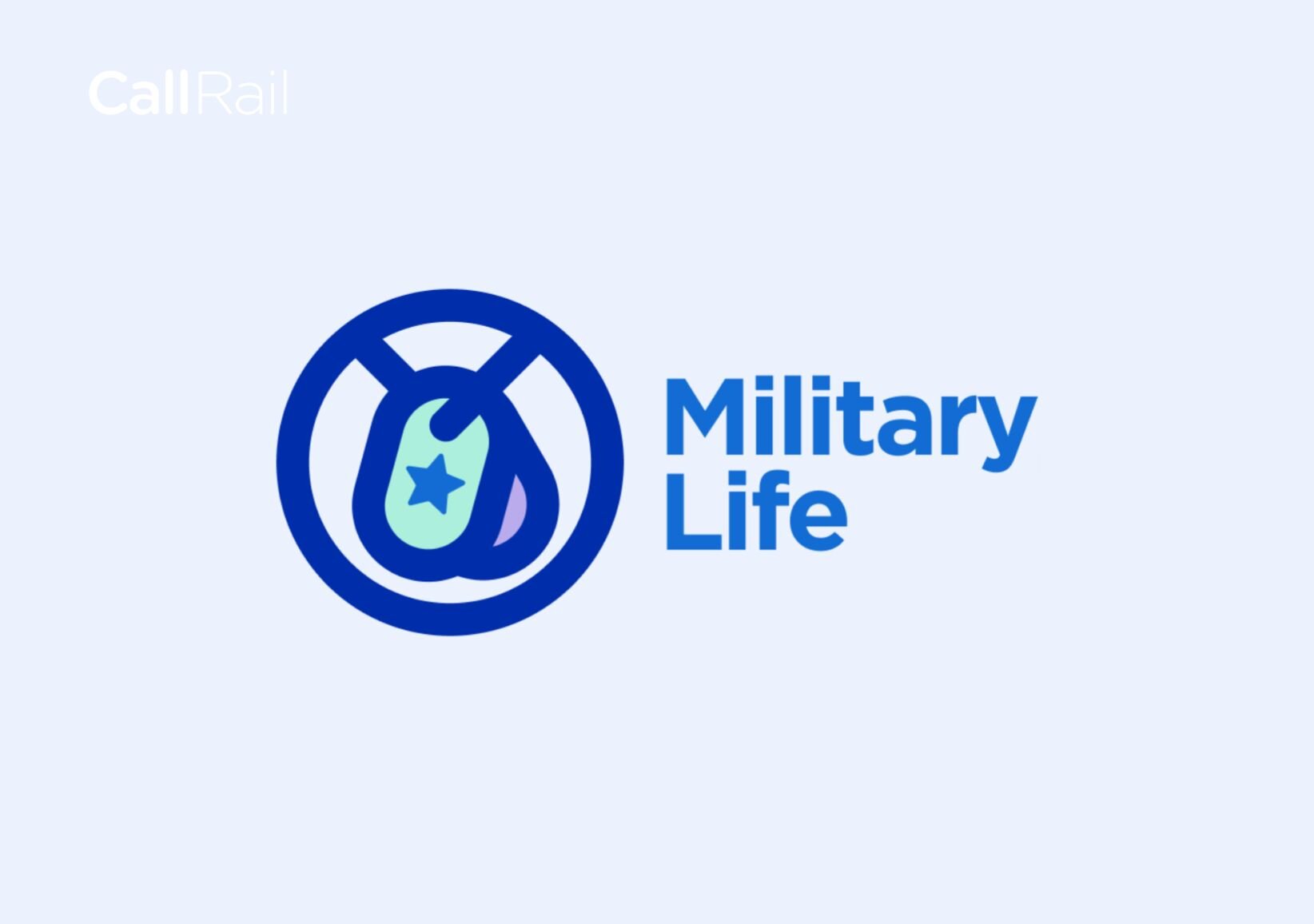Employee Resource Groups (ERGs) are an integral part of CallRail’s culture, creating space for connection, support, and shared growth across our team. These employee-led communities foster inclusion and belonging while helping individuals thrive personally and professionally. Military Life, our 8th and newest ERG, launched in January 2025 to support those connected to military service — through active duty, family, or as allies — and to champion advocacy, awareness, and community.
In April, the group hosted its first panel featuring members of its leadership team, who each bring lived experience from active duty, military childhoods, deployments, and reserve service. Moderated by Marisa Timko, the conversation spotlighted the voices of Tiara McClain, Malachi Bien-Aime, Wendy Squires, and Emily Popson — and the unique ways military life shapes work, identity, and community.

The Military Life ERG leadership team (from left) — Tiara McClain, Malachi Bien-Aime, Wendy Squires, Emily Popson (executive sponsor), and Marisa Timko — led CallRail’s first panel discussion, sharing stories shaped by military experiences.
The “why” behind military service
For many, joining the military is a life decision shaped by personal circumstances, family legacy, or a deep sense of duty.
Malachi Bien-Aime, Tier II Technical Support Specialist at CallRail and Military Life ambassador, shared that he joined the Marine Corps during college, driven by a mix of financial need and personal challenge. “I was looking for my path,” he said. “My brother had just joined, and I thought, ‘If he can do it, I can do it.’ Once I got in, I stayed because I loved the community. Now, I’ve got brothers and sisters for life.”
Wendy Squires, Technical Support Manager and the group’s co-chair, explained how she grew up in a military family and felt called to continue that legacy. “I love this country — flaws and all,” she said. “That’s what makes us the United States. We can have different opinions and still be united.”
What civilians don’t see: Misconceptions about military life
The group shared the often unseen emotional and logistical challenges of military life — including for families and children.
Emily Popson, VP of Growth Marketing and the ERG’s executive sponsor, is a Marine Corps spouse. She conveyed the ever-present uncertainty of life in the service.
“We’ve moved six times in 12 years. Sometimes we’re somewhere for just seven months. You start to feel settled and then — boom — you’re told you’re leaving.”
Tiara McClain, Sr. Project Manager and the group’s Treasurer, is a self-described “double brat,” with both of her parents having served in the military. She shared what it was like growing up in a military family, recalling, “One day I came home and half our stuff was packed. I didn’t even know we were moving. That’s how it was. As a military child, you’re just along for the ride.”
Tiara also pointed out a common misconception — that dual-military parents are always stationed together — which wasn’t her experience. “People assume that if both parents serve, they’re stationed together. That’s not always true. My mom had to wait six months to join us in Germany after my dad got reassigned.”
Military life meets civilian work: Balancing both worlds
Serving while holding down a civilian job presents another layer of complexity — especially for reservists and military spouses.
Malachi, now in the Marine Reserves, described the monthly mental shift:
“When I was active duty, I woke up a Marine and went to sleep a Marine. Now I have a job, kids, responsibilities — I have to mentally prepare for drill or to run three miles for Physical Fitness tests. It’s not as easy as it used to be, so I have to plan way ahead.”
Malachi went on to share — and the group agreed — that military communication is often direct, fast-paced, and mission-driven. While this can sometimes be misinterpreted as abrupt in civilian workplaces, it's simply a reflection of how they were trained to operate under pressure.
Wendy echoed the sentiment, noting how her military background shaped her approach to teamwork.
“You’re taught to be professional, get the job done, and own your mistakes. That mindset sticks, even in civilian roles.”
From the spouse’s perspective, Emily detailed how military life affects career-building for spouses:
“For families like mine, a deployment isn’t days — it’s months and years. You’re often far from family, without much flexibility. I’ve had to become a pro at communicating early and often — with my family, and with my employer.”
Home base: Choosing to live on or off base
The decision to live on a military base or in civilian housing depends on rank, availability, and personal needs — and often isn’t a choice at all.
The panelists shared varying perspectives on military housing, shaped by rank, location, and personal values. Emily explained, “Military families get a housing allowance, but if you live on base, you forfeit that,” adding that it’s often not about preference—many families face long waitlists or aging infrastructure.
Malachi recalled choosing off-base housing in California to save money but later moving on base for the added support during his wife’s pregnancy. “It was more than just cost—it was about community.” Tiara shared that her family intentionally lived off base overseas to immerse in the local culture, saying, “My parents wanted us to experience the culture, the language, the food. It gave me a broader worldview.”
From abroad to back again: The challenges of civilian transition
For Tiara, moving to Georgia at age 14 after growing up in Guam and Germany was a major adjustment. From riding yellow school buses to being restricted to campus during lunch, everyday life in the U.S. felt foreign. Even the financial reality was jarring — suddenly, her family had to pay for housing and utilities that were previously covered overseas.
More than the culture shock, Tiara emphasized the lack of support for military kids during transitions:
“There are resources to help adults adjust — but for kids, it can feel like you’re on your own.”
Bonus question: The MRE Debate
No panel would be complete without tackling one of the most hotly contested topics in military life: MREs, or Meals Ready to Eat. From best-in-box picks to the universally dreaded, our panelists didn’t hold back. The panelists also shared their field-tested hacks for getting through days-long survival training with limited rations (hint: save the coffee shot). Watch the clip for their takes — you might be surprised by which MREs topped the list.
Final reflections: Respect, empathy, and continued learning
As the panel wrapped, each speaker offered a personal takeaway.
- “Don’t assume everyone’s military experience is the same. And don’t forget about the kids — they often get overlooked.” — Tiara McClain
- “Spouses and families are serving too. They hold it down while we’re gone. Thank them.” — Malachi Bien-Aime
- “We joke differently. We’re direct. But underneath that is discipline, professionalism, and a desire to get things done.” — Wendy Squires
- “Media focuses on trauma and deployments—but the real challenge is navigating a world built for civilians. That’s why this ERG matters. It builds empathy.” — Emily Popson
Keep the conversation going
Military Life, like all of CallRail’s ERGs, exists to create space — for connection, visibility, and mutual understanding. This panel was just one example of how shared stories can bridge experiences and strengthen community. From active duty to childhood moves, from deployments to career pivots, the realities of military life are complex — and worth listening to.
We’ll continue to spotlight these voices, share resources, and foster dialogue through ongoing ERG programming across CallRail. Whether you’re connected to military life or passionate about building a more inclusive workplace, there’s a place for everyone to engage, learn, and lead. Interested in being part of a company that celebrates diverse experiences?
Explore careers at CallRail.










